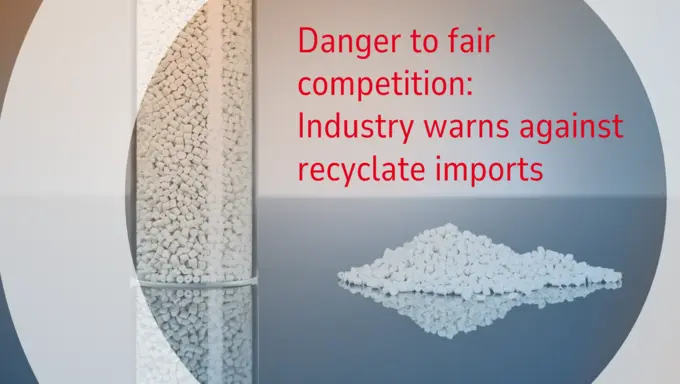Cologne, 20 August 2025 – A broad alliance of companies and associations from the packaging, consumer goods, and recycling industries is warning of severe market distortions caused by cheaply imported plastic recyclates of questionable origin. In a letter to the European Commission, the signatories appeal not to jeopardize the competitiveness of the European recycling industry through vague definitions and missing protective mechanisms.
Background: SUPD and PPWR in focus
The trigger is the draft implementing decision of the European Commission on the Single-Use Plastics Directive (SUPD). It is intended to regulate the calculation, verification, and reporting of the recyclate content in single-use beverage bottles. By aligning the SUPD definition with the Packaging and Packaging Waste Regulation (PPWR), recyclates from third countries could also be counted towards EU quotas in the future.
The alliance, which includes companies such as Alpla, REMONDIS, Werner & Mertz as well as industry associations such as BDE, bvse, and the German Sustainable Business Association, fears massive disadvantages for European recyclers. Cheap imports would put pressure on the market, undermine environmental objectives, and weaken consumer confidence in recyclate labeling.
Risks for circular economy and industrial policy
The associations emphasize that uncontrolled market opening would endanger the goals of important EU programs:
- Competitiveness Compass: doubling the share of recyclates in the EU economy.
- Clean Industrial Deal: linking competitiveness with climate and resource protection.
Without clear standards, the European circular economy risks being weakened rather than strengthened.
Call for a “Mirror Clause”
The signatories advocate maintaining the current SUPD definition or at least ensuring through a so-called “Mirror Clause” that imported recyclates meet the same quality and sustainability standards as EU materials. Only in this way can fair competition be guaranteed.
Connection to current developments: New minimum standard from August 2025
At the same time, Germany will publish the new minimum standard for the recyclability of packaging at the end of August 2025. This standard sets stricter requirements for packaging design and material transparency and is intended to help companies consistently design their packaging to be circular. The combination of EU regulations (PPWR) and national standards makes it clear: for manufacturers and retailers, it is more important than ever to rely on reliable and transparent recycling structures.
Conclusion
The European recycling and packaging industry is calling for clear framework conditions that ensure quality and fairness in the market. Only then can the goals of a functioning circular economy be achieved – for the protection of the environment, consumers, and the competitiveness of European companies.
About EKO-PUNKT
EKO-PUNKT, the dual system of REMONDIS, offers a comprehensive range of services in the fields of recycling and the circular economy. We actively support companies in fully meeting their Extended Producer Responsibility (EPR) and, in particular, in sustainably optimizing their packaging. From testing packaging recyclability – in the laboratory or digitally in our PackLab – to fulfilling international EPR obligations and developing a recyclate strategy: with our services, you can design your circular economy in a compliant, financially sustainable, and predictable way.
Autor
EKO-PUNKT GmbH & Co. KG
Vanessa Herzog
Waltherstr. 49-51
51069 Köln
T +49 221 964897-62
M +49 160 6184350
vanessa.herzog@eko-punkt.de
Quelle: EUWID
Bildnachweis: @REMONDIS / Fotograf: fuenf6 - Stretz
